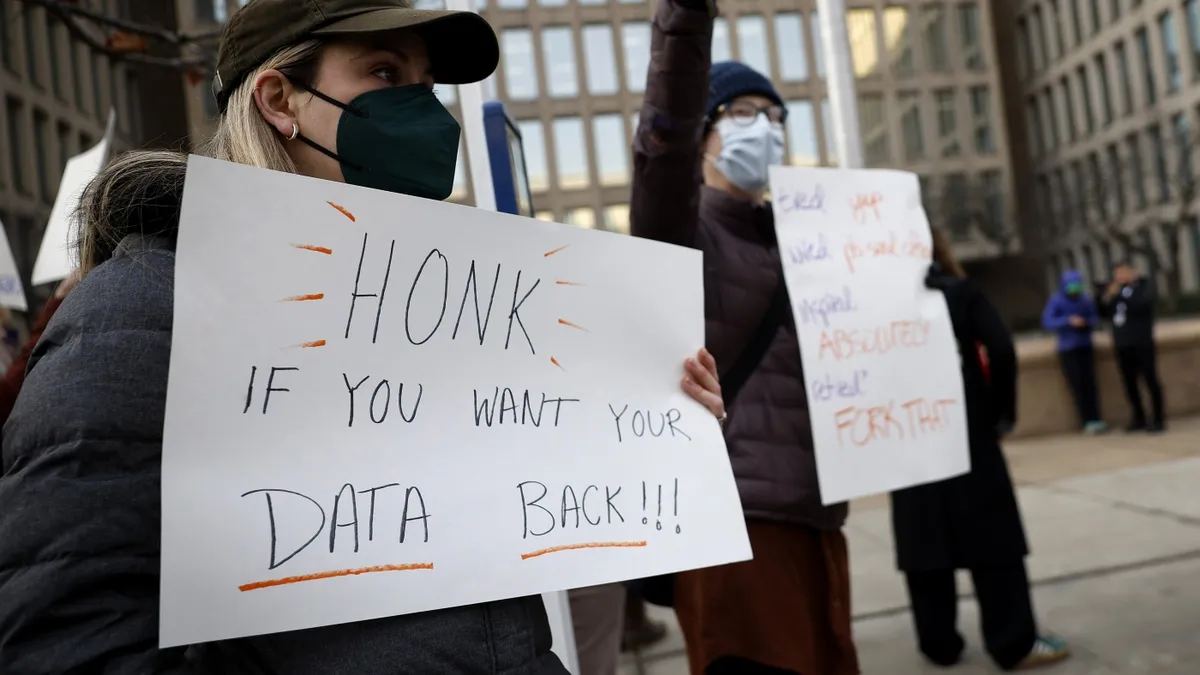
The U.S. Census Bureau has faced challenges with diminishing public participation in surveys and a growing distrust in the government for decades. Recent insights from current and former employees of the agency reveal that a new complication has emerged, further hindering the collection of essential statistics for the nation. The contentious handling of data during the Trump administration, which has led to numerous investigations and lawsuits over alleged privacy violations, is now one of the primary reasons cited by individuals who decline to share their information for ongoing federal surveys.
A former field representative of the Census Bureau noted an increase in skepticism when approaching households for interviews, with many people expressing concerns that their data could be sold or misused. This apprehension has been exacerbated by public discussions around notable figures such as Elon Musk, who served as an adviser to Trump and was linked to controversial data initiatives. This representative, who requested anonymity due to fears of retaliation, indicated that they encountered significant mistrust during their attempts to conduct surveys earlier this year.
A current field representative echoed these sentiments, expressing discomfort in their role compared to the previous year. They reported that individuals who had once willingly shared their information were now hesitant, with some outright mentioning DOGE when declining participation. "It’s a system that runs on trust," they remarked, "and I would say that trust has been declining." The representative lamented the state of public trust, stating, "I fear for the data I'm collecting. Is it going to be misused?"
The issue of public distrust is not new; Nancy Bates, a former senior researcher for survey methodology at the Bureau, has tracked the decline in public participation since the 1990 census. Federal law strictly prohibits the Census Bureau from releasing personal data that could identify individuals or businesses, yet a report prepared during the Trump administration revealed that 28% of respondents in 2018 expressed significant concerns over the confidentiality of their 2020 census answers.
Bates pointed out that even before the emergence of DOGE, there was already a considerable level of mistrust surrounding privacy and confidentiality. This concern has only intensified in light of unauthorized access to government data, which has sparked legal disputes surrounding data privacy protections. Critics warn that this environment increases the risk of data breaches, unauthorized access to personal information, and potential identity theft.
Despite the Census Bureau not being implicated in legal challenges related to data privacy, public perception remains fragile. Bates noted that the general public often struggles to differentiate between federal agencies, leading them to believe that if DOGE is gaining access to sensitive data from agencies like Social Security or the IRS, the Census Bureau might be vulnerable as well. This perception could significantly undermine the Bureau's ability to produce accurate statistics.
In response to concerns about declining participation rates, White House spokesperson Kush Desai stated that the refusal of a small group of individuals to engage with Census field representatives is not a new phenomenon. He argued that attributing widespread distrust in the Census to DOGE is a considerable overreach. Meanwhile, the Bureau's acting director, Ron Jarmin, reaffirmed the agency's commitment to delivering accurate and timely data on the nation’s demographics and economy.
Experts warn that the public's apprehension surrounding the Trump administration's data collection practices could have enduring implications for the accuracy and reliability of future data used to allocate political representation, monitor economic health, and direct federal funding for public services. A significant portion of individuals surveyed in 2018 expressed fears that their census answers would be shared with other government bodies, particularly among communities of color. This could lead to a skewed representation in statistical data, known as nonresponse bias, as marginalized communities may opt out of participating in surveys.
Statistics expert Trivellore Raghunathan from the University of Michigan highlighted the potential for increased nonresponse rates if specific populations perceive government data collection as a threat, particularly in contexts like immigration enforcement. "Distrust in the government could be prevalent in communities that decide not to participate in surveys," he explained, emphasizing the importance of representative data collection for accurate public policy.
Historically, federal statistical agencies have struggled to adequately represent Black, Indigenous, Latino, and Asian communities in their data. The Census has consistently undercounted people of color while overcounting white individuals who do not identify as Hispanic. Katharine Abraham, an economist at the University of Maryland, expressed concern that fears over government access to information could exacerbate existing challenges in gathering data from marginalized communities.
One strategy to combat declining survey participation is to leverage existing government records to fill gaps in demographic profiles. However, Abraham cautioned that the Trump administration’s lack of transparency regarding data access and protection protocols could hinder future efforts. A U.S. District Court judge recently criticized the administration for failing to provide adequate rationale for broad access to Social Security data.
Abraham contrasted the goals of data collection within statistical agencies—focused on informing policy—with the punitive objectives associated with DOGE's data initiatives. "The purpose in the DOGE world seems to be very much to go after individuals," she stated. This divergence in purpose raises concerns about the potential for backlash against statistical agencies, particularly if public trust continues to erode.
As the Census Bureau gears up for the 2030 census, including the upcoming major field test, Bates predicted that the agency's employees will face significant challenges in restoring public trust. "This is kind of like a tsunami of pushing the public to have higher mistrust levels," she remarked, suggesting that it may take years to rebuild confidence in the system.
For those with information regarding changes at the Census Bureau or other federal statistical agencies, journalist Hansi Lo Wang is available for contact via the encrypted messaging app Signal, offering a secure channel for communication.